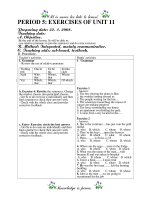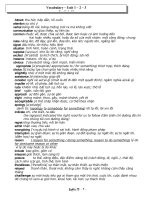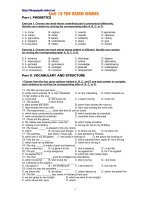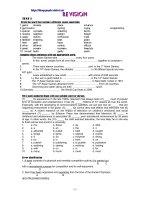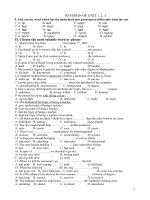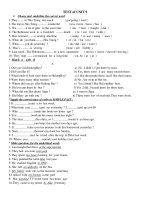Exercises of unit 3
Bạn đang xem bản rút gọn của tài liệu. Xem và tải ngay bản đầy đủ của tài liệu tại đây (197.13 KB, 10 trang )
Grade 12
Teacher : Quỳnh
REVISION
TEST 1
I. PRONUNCIATION
Choose the word that has the main stress placed differently from that of the others.
1. a. approach b. attract c. decent d. install
2. a. marvelous b. assistant c. maximum d.
argument
3. a. apologetic b. communicate c. attention d.
appropriate
4.
a.
verbal b. polite c. common d. social
5. a. compliment b. absolute c. fashionable d. suppose
II. LANGUAGE FOCUS
A. Choose t he one word or phrase - a, b, c or d - that best completes the sentences.
6. He agreed ____________them ________________the need for change.
a. to - about b. with - for c. to - at d. with - on
7. While studying he was financially dependent _________________his parents.
a. on b. to c. of d. from
8. It's rude to point ______________someone!
a. on b. out c. at d. up
9. It's OK to use _____________language if you're speaking to a friend.
a. verbal b. non-verbal c. formal d. informal
10. The proposal will go ahead despite strong_______________from the public.
a. objections b. refusals c. resistances d. disagreements
11. Although I spoke to him many times, he never paid any_______________________to what I said.
a. notice b. care c. mind d. attention
12. As you _______________the town, you'll see the college on the left.
a. come b. advance c. approach d. access
13. After listening to all the _____________I am-now of the opinion that there should be no new road.
a. attitudes b. regulations c. compliments d. arguments
14. Some people think it is _____________to ask someone's age.
a. rude b. impolite c. disrespectful d. discourteous
15. It's _______________knowledge that smoking and cancer are linked.
a. normal b. common c. wide d. complete
B. Choose the one word o r phrase - a, b, c or d - that b est completes the sentences.
16. The woman asked ________________get lunch at school.
a. can the children· b. whether the children could c. if the children can d. could the children
17. Did they say they _________________me again?
a. will telephone b. have telephoned c. would phone d. had phoned
18. Peter said that if he _______________rich, he________________a lot.
a. is - will travel b. were - would travel c. was - would have traveled d. had been - would have traveled
19. I pointed out to the manager that we __________________the bill.
a. already paid b. have already paid c. had already paid d. was already paid
20. I was wondering _______________a moment, please.
a. whether have you got b. that you've got c. if you've got d. how you've got
21. Someone told us _____________on the stairs.
a. don't sit b. not sit c. not to sit d. to not sit
22. All the students denied _______________anything about the matter.
a. to know b. knowing c. for knowing d. that they know
23. They said that they had come back ___________________.
a. the following day b. the next day c. the day after tomorrow d. the previous day
24. I asked him whose car _______________the previous day.
a. he had borrowed b. had he borrowed c. did he borrowed d. he would borrow
1
Grade 12
Teacher : Quỳnh
25. The office reminded us _______________the money.
a. remember to pay b. not to forget to pay c. to pay d. of paying
26. Martha_____________she would be late for the meeting. She_________________she was feeling ill.
a. told that - said that b. told that - said me that
c. told me that - said me that d. told me that - said that
27. They asked me ________________in Los Angeles then.
a. whether was my father working b. if my father was working
c. whether my father had been working d. was my father working
28. I have told her that I _______________ahead with my plans whatever she may think.
a. am not going to go b. was not going to go c. would not go d. was not able to go
29. When friends insist on _____________expensive gifts, it makes most Americans uncomfortable.
a. them to accept b. their accepting c. they accepting d. they accept
30. Jane told that she ______________her e-mail first thing every morning.
a. checks b. checked c. had checked d. was checked
C. Identify the one underlined word or phrase - A, B, C or D - that must be changed for the sentence
31. She says that she would have to close the shop unless business improves.
32. Every teacher I've spoken to tell me that standards of spelling are in decline.
33. They asked me how long did it take to get to Paris by train.
34. My mother told me to watch the milk and don't let it boil over.
35. Some engineers have predicted that, within twenty years, automobiles will be make almost completely of plastic.
III. READING
A. Fill in each blank with the correct form of one appropriate word from the box.
It is difficult to write rules that tell exactly when we should apologize, but it is not difficult to learn how. If we have
done something to hurt someone's feelings, or if we have been (36)______or rude, we should apologize. An apology
indicates that we realize we have made a mistake, and we are sorry for it. It is a way of expressing our regret for
something. When we apologize, we admit our wrongdoing, usually offer a reason for it, and express regret.
The (37)_____________way to apologize is to say, 'I'm sorry,' but often that is not enough. Let's take a common
situation. You are late for class and enter the classroom, (38)________the teacher in the middle of the lesson. What
should you do? The most polite action is usually to take a seat as (39)_____________as possible and apologize later.
But if the teacher stops and waits for you to say something, you could apologize simply "I'm sorry I'm late", ask
(40)___________to take your seat, and sit down. (41)____________, more than this a reason for the tardiness - is
needed, but this is not the time or the place for it because you have already caused one interruption and don't need to
make it any longer or (42)__________than it already is.
After class, when you can speak to the teacher (43)_____________, you can apologize again, this time giving
your excuse. You might say, "Mr. Blair, I'm sorry I was late for class this morning. I overslept and missed the bus". When
we give an excuse or reason to the person to whom we are apologizing, we are admitting (44)_____________. After the
excuse there sometimes (but not always) comes a promise to change, improve, or not to let the action happen again. For
example, after you give a reason for your (45)_____________, you might add, "I won't let it happen again" or "I promise
I'll be on time for now on."
B. Read the passage carefully, then choose the correct answer.
Sometimes people add to what they say even when they don't talk. Gestures are the "silent language" of
every culture. We point a finger or move another part of the body to show what we want to say. It is important
to know the body language of every country or we may be misunderstood. In the United States, people greet
each other with a handshake in a formal introduction. The handshake must be firm. If the handshake is weak,
it is a sign of weakness or unfriendliness. Friends may place a hand on the other's arm or shoulder. Some
people, usually women, greet a friend with a hug.
Space is important to Americans. When two people talk to each other, they usually stand about two and a half
feet away and at an angle, so they are not facing each other directly. Americans get uncomfortable when a
person stands too close. They will move back to have their space. If Americans touch another person by
accident, they say, "Pardon me." or "Excuse me." Americans like to look the other person in the eyes when
they are talking. If you don't do so, it means you are bored, hiding something, or are not interested. But when
2
simple bad tardy polite private communicate responsible natural quiet permit
interrupt society
Grade 12
Teacher : Quỳnh
you are stare at someone, it is not polite. For Americans, thumbs-up means yes, very good, or well done.
Thumbs down means the opposite. To call a waiter, raise one hand to head level or above. To show you want
the check, make a movement with your hands as if you are signing a piece of paper. It is all right to point at
things but not at people with the hand and index finger. Americans shake their index finger at children when
they scold them and pat them on the head when they admire them. Learning a culture's body language is
sometimes confusing. If you don't know what to do, the safest thing to do is to smile.
46. From the passage we can learn that__________________.
a. gestures don't mean anything while talking b. gestures can help us to express ourselves
c. American people often use body language in communication
d. It's confusing to understand a culture's body language
47. If you are introduced to a stranger from the USA, you should _______________.
a. greet him with a hug b. place a hand on his shoulder c. shake his hand weakly d. shake his hand firmly
48. American people often
a. show their friendship by touching each other
b. face each other directly when they are talking
c. say "Pardon me" to each other when they are talking
d. get uncomfortable when you stand or sit too close to them
49. When your friend give you a thumbs-up, he, in fact, _________________.
a. shows his rudeness to you b. shows his anger to you
c. expresses his satisfaction to you d. expresses his worries about you
50. Which of the following is NOT true about the culture of the United States?
a. It's impolite to look the other person in the eyes while talking.
b. It's rude to look at the other person for a long time.
c. Pointing at someone is usually considered rude.
d. It's all right to raise your hand slightly when you want to attract the waiter's attention.
IV. SPEAKING
Choose the phrase or sentence - a, b, c or d - that best completes the conversation.
51. A: You're a great dancer. I wish I could do half as well as you.
B: ____________________I'm an awful dancer!
a. You're too kind b. That's a nice compliment! c. You've got to be kidding! d. Oh, thank you very much.
52. A: Congratulations! You did great.
B: ______________________.
a. It's nice of you to say so. b. It's my pleasure. C . You're welcome d. That's okay.
53. A: ___________________.
B: Oh, thank you. I just got it yesterday.
a. When have you got this beautiful dress? b. You've just bought this beautiful dress, haven't you?
c. How a beautiful dress you're wearing! d. That's a beautiful dress you have on!
54. A: This dish is really nice!
B: ____________________It's called yakitori, and it's made with chicken livers.
a. It's my pleasure. b. I'm glad you like it. c. I guess you're right. d. Sure, I'll be glad to.
55. A: Your new hairstyle is quite attractive.
B: ____________________I think it makes me look 10 years older!
a. Thanks a lot. b. I'm sorry I don't like it. c. I hate it. d. That's a nice compliment.
V. WRITING
Choose the sentence - a, b, c or d - which is closest in meaning to the printed one.
56. "Shall I help you with the washing-up, Jane?" John said.
a. John told Jane to help him with the washing-up.
b. John asked if Jane should help him with the washing-up.
c. John suggested helping Jane with the washing-up.
d. John offered to help Jane with the washing-up.
57. "What will you do if you have ten days off school?" he asked.
a. He asked me what will I do if I have ten days off school.
b. He asked what I will do if I have ten days off school.
c. He asked me what I would do if I had ten days off school.
3
Grade 12
Teacher : Quỳnh
d. He asked what would I do if I had ten days off school.
58. "You'd better apologize for being so rude," said my friend.
a. My friend advised me to apologize for being so rude.
b. My friend offered me to apologize for being so rude.
c. My friend warned me to apologize for being so rude.
d. My friend suggested me apologizing for being so rude.
59. "Good morning, Mary! How are you?" Henry said.
a. Henry said good morning Mary and asked how was she.
b. Henry greeted Mary and asked how is she.
c. Henry said good morning and asked Mary how she is.
d. Henry greeted Mary and asked how she was.
60. "Please don't leave until I come back," Sarah said.
a. Sarah told us do not leave until she comes back.
b. Sarah asked us not leave until she came back.
c. Sarah told us not to leave until she came back.
d. Sarah said to us to not leave until she comes back .
TEST 2
I. PRONUNCIATION
A. Choose the word that has the underlined part pronounced differently from that of the others.
1. a. attract b. clap c. wave d. hand
2. a. signal b. slightly c. polite d. excite
3. a. allowed b. passed c. argued d. raised
4. a. discuss b. jump c. argument d. Public
5. a. excited b. excuse c. exchange d. example
B. Choose the word that has the main stress placed differently from that of the others.
6. a. approach b. social c. discuss d. consider
7. a. impolite b. informality c. appropriate d. situation
8. a. compliment b. terrible c. perfectly d. attract
9. a. assistance b. marvelous c. argument d.
fashionable
10. a. signal b. install c. decent d. verbal
II. LANGUAGE FOCUS
A. Choose the word or phrase - a, b, c or d - that best completes the sentence.
11. Why did you object______________the scheme for building a kindergarten in our neighborhood?
a. to b. against c. at d. in
12. She received several compliments __________________her speech.
a. to b. on c. for d. about
13. They were very apologetic ___________________the trouble they'd caused.
a. on b. to c. about d. with
14. I _____________very well with my roommate now; we never have any arguments.
a. go on b. carryon c. get on d. put on
15. He'll be very upset if you his offer 'of help.
a. turn away b. turn into c. turn off d. turn down
16. Despite being a big star, she's very _______________.
a. approachable b. fashionable c. acceptable d. accessible
17. It's no more than common _________________to hear what she has to say.
a. polite b. impolite c. politeness d. impoliteness
18. Phone me before ten; ___________I'll be too busy to talk to you.
a. otherwise b. whether c. unless d. if
19. This young author has already received the sort of ___________________that many older and wiser
heads have had to strive a lifetime for.
a. attention b. note c. recognition d. attraction
20. The campers _____________their tent in a sheltered valley.
a. pitched b. installed c. established d. fixed
4
Grade 12
Teacher : Quỳnh
21. It was very _______________more of a chat than an interview.
a. formal b. informal c. formality d. informality
22. Gestures such as waving and handshaking are __________________forms of communication.
a. direct' b. regular c. verbal d. non-verbal
23. She was a devoted nurse, always very _______________to the needs of her elderly patients.
a. observant b. attentive c. careful d. delicate
24. I think access to cinemas and theaters is the main_______ ___________of city life.
a. amenity b. attraction c. leisure d. recreation
25. I make no ____________for encouraging my children to succeed in school.
a. apologize b. apologetic c. apologies d. apoplectic
B. Choose the word or phrase - a, b, c or d - that best completes the sentences.
26. The visitors were complaining _________________in the rain.
a. for waiting b. me about waiting c. about having to wait d. that they have to wait
27. In the interview, Mr. Brown acknowledged that he to be prime minister.
a. wish b. wished c. would wish d. was wishing
28. The effects of cigarette smoking __________________to be extremely harmful so far.
a. is proved b. will be proved c. are proved d. have been proved
29. When I last______________my cousin Lucy, she______________hard preparing for her final exams.
a. saw - was working b. saw - worked c. have seen - worked d. see - is working
30. The accused denied _____________in the vicinity of the murder scene.
a. to have ever been b. have ever been c. having been ever d. ever having been
31. She told me that she ____________physiology.
a. has studied b. has been studying c. had been studying d. would have studied
32. The doctor has advised _______________too much coffee.
a. me not drink b. I don't drink c. me not drinking d. me not to drink
33. Angie warned __________________anyone what she had told me.
a. that I didn't tell b. that I told not c. me to tell not d. me not to tell
34. My mother told me ___________my books ________________about on the living room.
a. don't leave - lying b. didn't leave - lie c. not to leave - lying d. not to leave - to lie
35. She wondered ____________now, after so many years away.
a. how her father looked like b. whose her father looks like
c. how her father looks like d. what her father looked like
36. Rosa suggested _____________a suit and tie when he went for the interview.
a. him to wear b. he wore c. he must wear d. that he wears
37. He said that the plane had already left and that I an hour earlier.
a. must have arrived b. had to arrive c. should have arrived d. was supposed to arrive
38. Helen asked me _____________the film called 'Star Wars'.
a. if I saw `b. whether I have seen c. if I had seen d. whether had I seen .
39. Nobody knows why _______________until next week.
a. the meeting postponed b. was the meeting postponed
c. did the meeting postpone d. the meeting was postponed
40. It was only later ______________what his story meant.
a. then I comprehended b. that I comprehended c. did I comprehend d. had I comprehended
C. Identify the one underlined word or phrase - A, B, C or D - that must be changed for the sentence to be
correct.
41. The consultant said management had better to formalize its employment policies and procedures in
order to avoid adverse employment claims in the future.
42. The author has not rarely written anything that was not a best-seller.
43. The Dean of the College of Education has already decided whether permit the meeting
to be held on campus.
44. Several cars plunged into the water, when the pier was striking by a barge that separated from its tugboat.
45. Ron said that he wasn't sure, but the storm might stop already.
46. For many years people have wondered that life exists elsewhere in the universe.
47. Public health experts say that the money one spent avoiding illness is less than the cost
5
